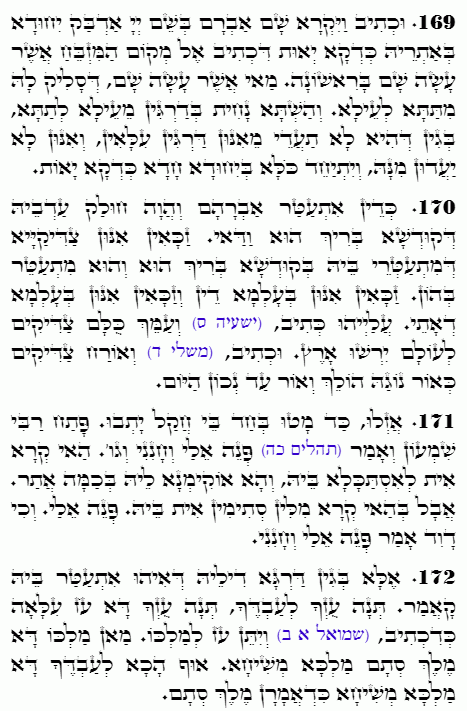Daily Zohar # 4695 – Lech Lecha – Give Your strength to Your servant
Daily Zohar 4695

Hebrew translation:
170. אָז הִתְעַטֵּר אַבְרָהָם וְהָיָה לְחֵלֶק גּוֹרָלוֹ שֶׁל הַקָּדוֹשׁ בָּרוּךְ הוּא וַדַּאי. אַשְׁרֵיהֶם הַצַּדִּיקִים שֶׁמִּתְעַטְּרִים בַּקָּדוֹשׁ בָּרוּךְ הוּא וְהוּא מִתְעַטֵּר בָּהֶם. אַשְׁרֵיהֶם בָּעוֹלָם הַזֶּה וְאַשְׁרֵיהֶם בָּעוֹלָם הַבָּא. עֲלֵיהֶם כָּתוּב (ישעיה ס) וְעַמֵּךְ כֻּלָּם צַדִּיקִים לְעוֹלָם יִירְשׁוּ אָרֶץ, וְכָתוּב (משלי ד) וְאֹרַח צַדִּיקִים כְּאוֹר נֹגַהּ הוֹלֵךְ וָאוֹר עַד נְכוֹן הַיּוֹם.
171. הָלְכוּ. כְּשֶׁהִגִּיעוּ לְשָׂדֶה אֶחָד יָשְׁבוּ. פָּתַח רַבִּי שִׁמְעוֹן וְאָמַר, (תהלים כה) פְּנֵה אֵלַי וְחָנֵּנִי. בַּפָּסוּק הַזֶּה יֵשׁ לְהִסְתַּכֵּל בּוֹ, וַהֲרֵי בֵּאַרְנוּ אוֹתוֹ בְּכַמָּה מְקוֹמוֹת. אֲבָל בַּפָּסוּק הַזֶּה דְּבָרִים נִסְתָּרִים יֵשׁ בּוֹ. פְּנֵה אֵלַי – וְכִי דָוִד אָמַר פְּנֵה אֵלַי וְחָנֵּנִי?
172. אֶלָּא בַּעֲבוּר דַּרְגָּתוֹ שֶׁהוּא מִתְעַטֵּר בָּהּ הוּא אָמַר. (שם פו) תְּנָה עֻזְּךָ לְעַבְדֶּךָ – תְּנָה עֻזְּךָ זֶה הָעֹז הָעֶלְיוֹן, כַּכָּתוּב (שמואל-א ב) וְיִתֵּן עֹז לְמַלְכּוֹ. מִי מַלְכּוֹ? זֶה מֶלֶךְ סְתָם, מֶלֶךְ הַמָּשִׁיחַ. אַף כָּאן לְעַבְדֶּךָ זֶה מֶלֶךְ הַמָּשִׁיחַ, כְּמוֹ שֶׁאָמַרְנוּ מֶלֶךְ סְתָם.
.
Zohar Lech Lacha
Continued from previous DZ
#169
It is written, “וַיִּקְרָא שָׁם אַבְרָם בְּשֵׁם ה'” “And Abram called on the name of YHVH” (Genesis 13:4), meaning that he established the unification in its proper place. As it is written, “אֶל מְקוֹם הַמִּזְבֵּחַ אֲשֶׁר עָשָׂה שָׁם בָּרִאשֹׁנָה” “to the place of the altar which he had made there at first.” What is the meaning of “אֲשֶׁר עָשָׂה שָׁם” “which he had made there”? Initially, he elevated the Nukva from below to above, as mentioned earlier. Now, he brought her down through the levels, from above to below, so that she would not depart from these higher levels, and they would not depart from her. In this way, everything was united in a single unification as it should be.
Notes:
The Zohar highlights Abram’s role in fostering spiritual unity by balancing the position of Nukva within the spiritual structure. His elevating and lowering Nukva symbolize a harmonious flow between the upper and lower realms, ensuring that the feminine (Malchut) remains connected to higher sources (Zeir Anpin) of holiness. This balance, maintained through Abram’s efforts, underscores the importance of harmony between masculine and feminine spiritual forces, promoting a stable and unified spiritual reality. Abram’s calling on the name of Hashem reflects his alignment with the purpose of uniting all aspects of creation in a single, cohesive unity.
#170
Then Abraham was crowned and truly made a part of his portion in YHVH. Blessed are the Tzadikim who are crowned with the Holy One, Blessed be He, and They crown him. Blessed are they in this world, and blessed are they in the World to Come. About them, it is written, “וְעַמֵּךְ כֻּלָּם צַדִּיקִים לְעוֹלָם יִירְשׁוּ אָרֶץ” “And your people are all righteous; they shall inherit the land forever” (Isaiah 60:21). And it is also written, “וְאֹרַח צַדִּיקִים כְּאוֹר נֹגַהּ הוֹלֵךְ וָאוֹר עַד נְכוֹן הַיּוֹם” “And the path of the righteous is like the light of dawn, shining brighter and brighter until the full day” (Proverbs 4:18).
Notes:
The Zohar praises the achievements of the Tzadikim, exemplified by Abraham, who attained a deep union with Hashem and was crowned with supernal blessings. This mutual crowning signifies a reciprocal relationship in which the dedication of the Tzadikim elevates Hashem’s presence in the world while Hashem, in turn, blesses and uplifts them. The metaphor of light shining brighter reflects the ongoing, expanding nature of spiritual growth, culminating in complete alignment with Hashem.
#171
They walked, and when they came to a certain field, they sat down. Rabbi Shimon opened and said, “פְּנֵה אֵלַי וְחָנֵּנִי” “Turn to me and be gracious to me” (Psalms 86:16). This verse requires contemplation, and we have explained it in many places. However, there are hidden matters within this verse. “פְּנֵה אֵלַי” “Turn to me”—one may ask, would David, who was humble, really say, “Turn to me and be gracious to me”?
Notes:
The Zohar examines the complexity of King David’s prayer for Hashem’s grace. While the words might seem straightforward, the Zohar encourages a deeper look into the hidden meanings. David’s request, “Turn to me and be gracious to me,” can be seen as an expression of humility and dependency on Hashem rather than self-centeredness. The request embodies the dual nature of humility and Hashem’s closeness, emphasizing that true humility involves an awareness of one’s need for the support of Hashem. Rabbi Shimon’s reflection on this verse illustrates how prayer can contain layers of meaning, bridging personal vulnerability and connection to the supernal levels.
#172
He answers that David said this for the sake of the level at which he is crowned. That is, he prayed on behalf of the Nukva of Zeir Anpin, saying, “תְּנָה עֻזְּךָ לְעַבְדֶּךָ” “Give Your strength to Your servant” (Psalms 86:16). “Give Your strength” refers to the supreme strength, which is Chokhmah, as it is written, “וְיִתֵּן עֹז לְמַלְכּוֹ” “And He gave strength to His king” (1 Samuel 2:10). Who is His King? This is the King, understood as the King Mashiach, which refers to Malchut of Zeir Anpin. Here, too, “לְעַבְדֶּךָ” “to Your servant” means the King Mashiach, as we said before, the simple King, meaning the Nukva.
Notes:
David’s request, “Give Your strength to Your servant,” is seen as a plea for wisdom and strength to be bestowed upon Malchut, ultimately facilitating the realization of Mashiach presence. This prayer ensures that the Nukva is equipped to fulfill her essential role. Through this, David exemplifies the role of the Tzadikim in supporting and advocating for the stability and completion of all spiritual levels, leading toward a harmonious and redemptive future.
{||}

 Previous: Lech Lecha
Previous: Lech Lecha

